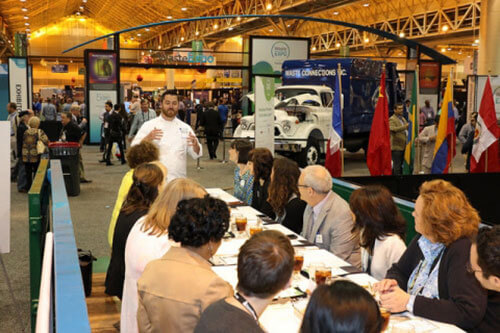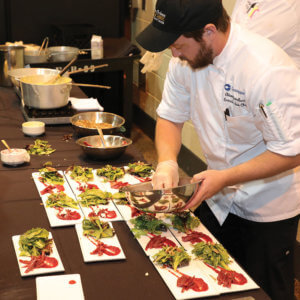Food waste is an increasingly important topic throughout meetings industry. Now imagine how big it must be for WasteExpo, the largest show in the United States for the waste-management, recycling, and organics industry. “Because we’re about waste and recycling,” said Mark Hickey, vice president of Waste360, which produces WasteExpo, “there’s a whole movement here looking at how food waste can be more productively managed in terms of recovery for consumption and also not being taken to landfills.”

MCCNO’s Centerplate chefs took WasteExpo’s emphasis — reduce, reuse, repurpose — to heart and into their kitchen.
At WasteExpo 2017, held at the New Orleans Ernest N. Morial Convention Center (MCCNO) on May 8–11, everyone who entered the exhibit hall passed by a large, clean dumpster with wooden benches inside. That’s not necessarily out of place at a show like WasteExpo, but anyone coming through around noon on May 10 saw something odder: a group of 14 people sitting inside the dumpster, eating a “zero-waste” lunch.
Hickey says the idea grew from two seeds: a Waste360 article about the “Salvage Supperclub” in San Francisco, and the expo’s own Food Recovery Forum, which returned for its second time this year. WasteExpo planners first contacted Centerplate, MCCNO’s caterer, to see if they’d be willing to cook up a no-waste lunch — made entirely from food that either was left over from other meals or typically would be thrown away during the cooking process. Executive Chef Brandon Felder remembers being “kind of taken aback” by the request at first, but after brainstorming with his sous chefs, the ideas started to flow and the challenge seemed more fun than daunting.
The three-course lunch started off with a beet salad, which included a beet puree made from the root vegetable’s often-scrapped tops. Felder and his team also rescued pecan dust — tiny bits that are usually tossed — and used it as a salad topper. For a dressing, they grabbed champagne leftover from earlier that day and made apple-cider vinegar with leftover cider from the bar. The greens themselves were an over- order from a previous event.
In his barbecue-shrimp entrée, Felder roasted shrimp shells, made a stock with them that went into his barbecue sauce, and even ground up some shells to put in a spice rub. On the side, he used excess grits from breakfast and mixed them with cauliflower scraps. The repurposing continued at dessert, which used leftover French bread and overripe bananas for a Bananas Foster bread pudding. Its sauce included leftover rum from the alcohol service at a previous event.

Waste Expo 2017 at the Ernest N. Morial convention center in New Orleans.
“I didn’t order anything for that lunch,” Felder said. “All the food was in-house and something we were going to discard or compost or send to a shelter. That week, I saved it all.”
In describing the special luncheon, Hickey emphasizes the word visible. That was WasteExpo’s main goal: to bring everyone’s attention to food waste and possible solutions. It’s why he made sure there were signs near the dumpster, explaining what was happening. “The idea is to get the light bulb to go on,” Hickey said. “And it’ll take a while. These are initial efforts to make people think differently about food and how it’s consumed or what you do if it’s not consumed.”
It also tasted good. The lunch guests — who included a leader from the U.S. Environmental Protection Agency, a food-bank CEO, and a U.S. Department of Agriculture director — were “blown away by how much flavor we could pack into it,” Felder said, “and the story behind each course.”
Hickey plans to repeat the lunch at WasteExpo 2018, which will be held at the Las Vegas Convention Center next April. The guest list will stay small — he wants to keep it contained to a dumpster again — but he’s thinking about having companies sponsor individual diners and then donating that money to charity. “We made it real,” Hickey said of the lunch’s impact. “This wasn’t just people talking about stuff in an educational session. It was a real event with real food, and people were very enthusiastic about it.”
The Food Recovery Forum
After a successful debut at WasteExpo 2016, the Food Recovery Forum returned for a second time this year. The forum included 15 educational sessions and a keynote with speakers from the U.S. Department of Agriculture and the Environmental Protection Agency — along with a workshop on “How to Start a Food-Diversion Program and Make It Sustainable.” According to WasteExpo’s Mark Hickey, the forum focuses on two big questions: How do you get food to people who need it rather than wasting it, and how do you keep organic waste out of landfills?
